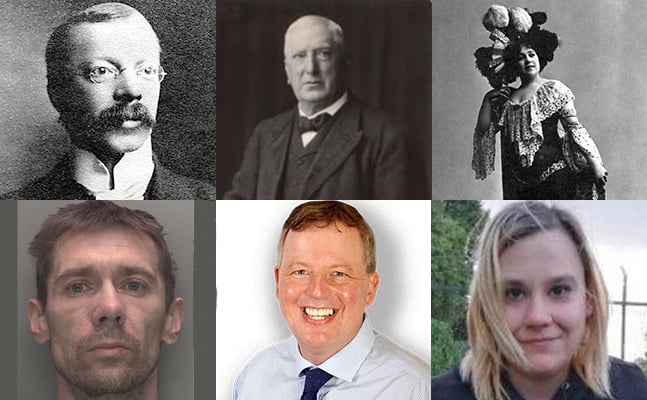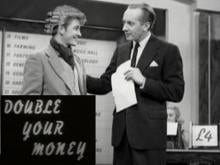
(Clockwise from left) Crippen, Muir, Cora, Golabek, Aspden, Ranoszek.
A barrister has used the same line of questioning which was instrumental in convicting Dr Hawley Crippen over 100 years ago to ensnare another murderer.
Gordon Aspden KC dusted off his copy of History's Most Famous Murderers for the trial of Kamil Ranoszek, who was accused of bludgeoning Ilona Golabek to death at their flat last year after he discovered she had been in contact with other men over the Tinder dating app.
Ranoszek claimed that on the evening of her death he returned home from a friend's birthday party and went to bed while Golabek was sitting on the sofa using her phone. He said that when he got up the next day, she had vanished.
Golabek's remains were found three days later in a park in Boston, Lincolnshire, but the evidence against Ranoszek was circumstantial.
However, Aspden, from 7BR chambers, deployed the same series of questions used by prosecutor Richard Muir to convince the Old Bailey of Crippen's guilt in 1910 to persuade a jury at Lincoln Crown Court that Golabek had not left the flat alive.
Crippen, an American homeopath, was accused of poisoning and dismembering Cora, his wife, and hiding her torso under the basement floor. His defence alleged that a previous tenant was responsible for the remains, and that Cora had fled to America with another man.
Muir asked Crippen at his trial, "On the early morning of 1 February you were left alone in your house with your wife?" Crippen answered, "Yes".
Muir: "She was alive?"
Crippen: "Yes."
Muir: "And well?"
Crippen: "Yes."
Muir: "Do you know of any person in the world who has seen her alive since?"
Crippen: "I do not."
A jury found Crippen guilty and he was hanged at Pentonville Prison. 112 years later, Aspden asked Ranoszek, "At 11pm on the night of 9 November, you returned home and were left alone in the sitting room of 26a Wormgate with Ilona Golabek. Is that right?" Ranoszek answered, "Yes".
Aspden: "Ilona Golabek was alive?"
Ranoszek: "Yes."
Aspden: "And well?"
Ranoszek: "Yes."
Aspden: "Do you know of any person in the world who has seen her alive since then?"
Ranoszek: "No."
After the barrister concluded his case and following three days of deliberations, the jury found Ranoszek guilty of murder.














Comments
81
35
You don't need to change perfection. There must be dozens of other classic bits barristers should be dredging up.
117
33
"My client is GUILTY."
*turns page*
"...er, of nothing more than..."
97
33
Can someone explain how these Q&A are in any way demonstrative of guilt? I don't get it
51
35
+1 don't get it. I would have said 'no' if I was guilty or otherwise. Lock me up I guess.
62
42
@10:08 - if the accused really believed that the victim had just wandered off, they would be sure that someone (even if they didn't know who) would have seen them - in particular, the "real" murderer. It's the certainty with which they dismiss that possibility that convicts them.
46
44
@Probs guilty then
It isn't particularly complicated, perhaps you are overthinking it. It's just a neat line of questioning which establishes that the witness was the last known person to see the deceased alive.
The last person to see a person alive before they are murdered (at least in murders of this nature) is their killer.
42
37
I also don’t get this.
42
53
what?
is rof news now reduced to "A barrister has asked questions! and not just any questions! but questions that have been used before?"
is this some sort of sleeper cell code message? are some russian agents off to kidnap [insert PM of UK current at the time of reading] at this very moment thanks to this non story?
33
37
@ I'm dumb 28 October 22 10:08
I think the premise is that if you (i.e. the baddie) say that someone else dun it, then saying that you're the last person to have seen the victim alive is a direct contradiction. Unless you claim that the real murder was blind or it was just really really dark.
43
38
@I'm dumb 10:08
Crippen was accused of killing his wife. His defence was that he bore no malice towards her, that she left him suddenly and that he knew of no other person in the world who had seen her alive. If he didn't want her dead, why didn't he make attempts to locate her? The line of questioning suggests he didn't look for his wife (from whom he claimed not to be estranged) because he killed her.
24
37
@I'm dumb 28 October 22 10:08
This is common law.
52
34
The interesting thing about the Crippen case is that the remains in the cellar, assumed at the time to be of the woman he was accused of killing, were DNA tested recently and discovered to be the remains of a different woman entirely.
35
34
This conviction seems shaky...
47
37
Yeah, I'm struggling with this too. If the victim had been murdered by a random, then the defendant would not have known who had seen her to do it.
50
39
Do YOU know of any person in the world who has seen her alive since then? I don't.
I mean she might have walked out of the house and met the postman, who may or may not have killed her. I still don't get it and I'm sure the guy whose first lanaguge is not English is wondering what the hell it meant. He has plenty of time to think about it.
41
40
Elle Woods did this much better
37
35
I was expecting to read some line of questioning that was actually probative of something.
One of the other lines of questioning that sits in folklore was along the lines of an expert being asked in x xmn if he knew the coefficient of expansion of some metal, which to my mind is a bit like asking the barrister if they know what subject is covered on page 420 of Archbold.
34
31
The true murderer could have been blind.
35
38
DID YOU ORDER THE CODE RED?
38
35
Jesus Christ. I hope there was more evidence than the line of questioning provided. Particularly as the Crippen body was found not to be his wife’s.
25
41
I’m sure Gordon’s killer question would have concerned the coefficient of the expansion of brass.